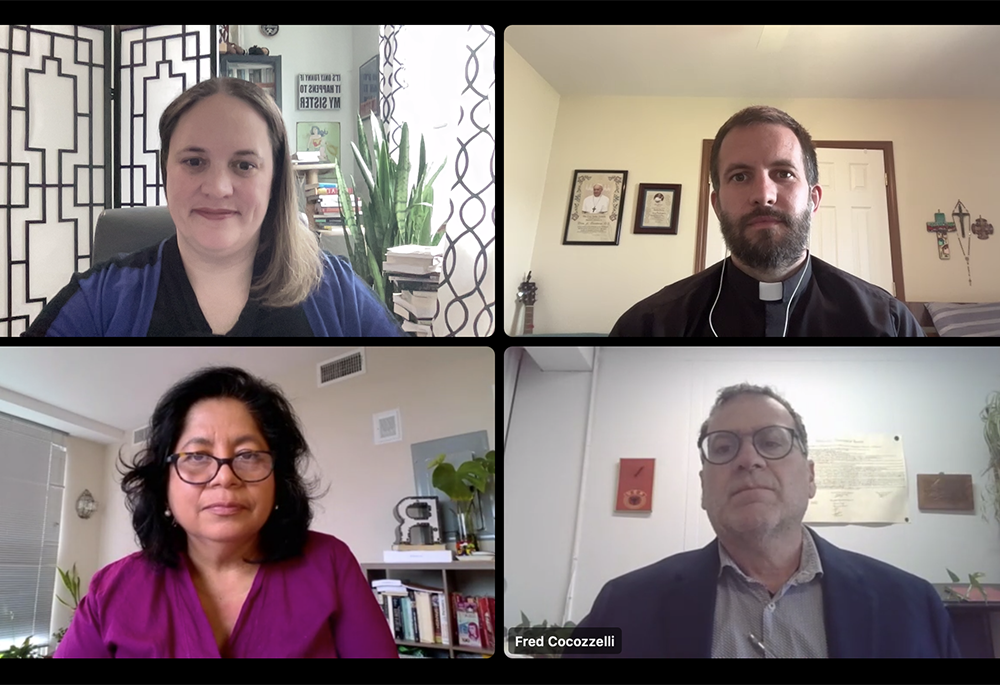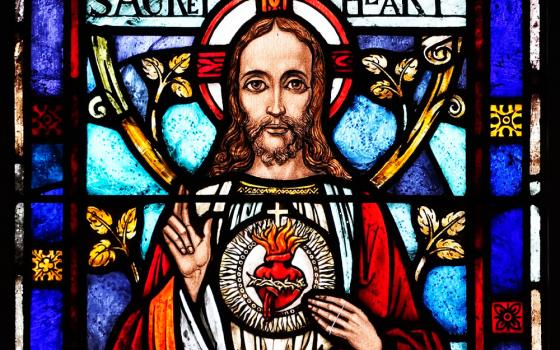
Clockwise from top left: Host/moderator Meghan Clark, associate professor of theology and religious studies and assistant chair of St. John's College of Liberal Arts and Sciences; Jesuit Fr. Brian Strassburger, director of Del Camino Jesuit Border Ministries, Brownsville, Texas; Fred Cocozzelli, chair of the department of government and politics at St. John's University; and Rhina Guidos, GSR Latin America regional correspondent, participate in a panel discussion on the Catholic Church in Nicaragua hosted March 6 by St. John's University. (Screenshot by Melody Finnemore)
A few months ago, Rhina Guidos was talking with students at a Catholic university in Washington, D.C., and asked them to imagine U.S. soldiers bursting in on the conversation, taking them to prison, injuring some and even killing others. All at the government's direction.
That is exactly what is happening in Nicaragua, where President Daniel Ortega ordered the arrests of several clergymen, forced them into exile and instructed his regime to seize the property of many Catholic religious orders.
Guidos, Latin America regional correspondent for Global Sisters Report, has reported extensively on the ongoing political conflict in Nicaragua and took part in a March 6 panel discussion about it that was hosted by St. John's University in Queens, New York. Other panel participants were Jesuit Fr. Brian Strassburger, director of Del Camino Jesuit Border Ministries in Brownsville, Texas, and Fred Cocozzelli, chair of St. John's department of government and politics.
Meghan Clark, associate professor of theology and religious studies and assistant chair of St. John's College of Liberal Arts and Sciences, served as host and moderator of the panel, which noted unanimously that the conflict has been largely neglected by media in the United States even though it directly impacts migration at the country's southern border.
On Jan. 14, Ortega released Nicaraguan Bishop Rolando Álvarez, a frequent critic, after he spent over 500 days in jail. Álvarez and 18 other clergymen who were imprisoned were forced into exile. Álvarez's imprisonment symbolized the Sandinista regime's descent into totalitarianism and its unrelenting persecution of the Catholic Church.
On Aug. 23, 2023, Nicaragua's government declared the Society of Jesus illegal and ordered the confiscation of all of its property. That included the Jesuit-run University of Central America, which Ortega called a "center of terrorism." The university was a hub for 2018 protests against the Ortega regime, according to The Associated Press.
"It's something that is not limited to Catholic campuses. Catholic sisters have been expelled, including some who were elderly and some with disabilities," Guidos said. "I think it's fair to say the relationship between the church and the government is nonexistent."
Guidos noted that public celebrations such as Holy Week are now prohibited, and many Catholics are afraid to speak out about what is happening or make their connection to the church known. Fear of the political crisis and, in particular, the targeting of the Catholic Church is driving many Nicaraguans to flee to the United States border in search of asylum.
Cocozzelli referred to the Nicaraguan revolution in the late 1970s, which gave rise to the Sandinistas and failed to change significant structures of inequality, making conditions ripe for the conflict between the government and religious, social and humanitarian organizations.
"Not a lot of people are paying attention in the United States. We're more fixated on our own problems and we have a lot of problems," he said. "Instabilities in Central America and Latin America feed into the U.S. migration crisis. I think there's a lot to be said for the current moment and we need to pay attention because it has impacts in a lot of ways."
Advertisement
Strassburger, who was missioned to Managua, Nicaragua, recalled the Jesuits' long history there and its previous collaborations with the government. That began to change with the 2018 protests, when soldiers intervened and were aggressive with the students.
"There was this real movement in 2018 where we thought maybe some change could happen and some talks were held, and the Catholic Church was invited to be moderators because they were seen as a trusted institution by the Nicaraguan people," he said.
Instead, the government became more antagonistic toward the church. In 2021, Strassburger's organization, Roncalli Association/John XXIII, which helped with small business development projects in rural communities and ran a youth formation program, was shut down as were other nonprofits, particularly those with Western funding.
Strassburger lived in the community at the University of Central America and described how two armed, masked men came and told everyone they had two hours to vacate the property before the government seized it, even though it was owned by the Society of Jesus.
"It is impossible to quantify the damage that has been done to the people of Nicaragua. It is profound and it is extensive," he said, adding rural pharmacies have shut down and people have to travel for hours to a city for their medications. Access to education is now limited, and water projects have been suspended in rural communities.
Cocozzelli explained that such shutdowns are a normal means of promoting authoritarianism, which relies on isolation and fear. Churches often serve as a place where people can gather to share their common experiences and problems, so they are a prominent target for oppression.
"These places have a kind of legitimacy that the regime doesn't. As an authoritarian regime, they are trying to absorb that sense of legitimacy," he said.
Despite the government's efforts to hinder the Catholic Church, Guidos said she encounters plenty of stories of hope and resistance. Among them, the clergymen exiled from Nicaragua have received hospitality and support from the communities that received them, including help finding jobs and housing.
"You see all of these acts of kindness and solidarity. It's really neat to see the people come out and have that solidarity," she said.
Guidos recently traveled to El Salvador where she talked to a friar who had passed by a church that had bullet holes in it. Though the church could afford to repair the damage, its leaders chose not to because they want people to see it and remember what happened.
"He also said that the Masses were really full and that can be seen as a type of resistance," she said.
Clark noted that it is often Catholic sisters who are out there living with, working with and ministering to people who struggle in the most difficult conditions, and Guidos recalled talking with a sister who has been exiled.
"It's not leaving the buildings behind, but the people you have been helping," she said, adding the sister is now focused on the ministry of listening to those who fear speaking out. "She has turned something that is dangerous into something that is holy."








